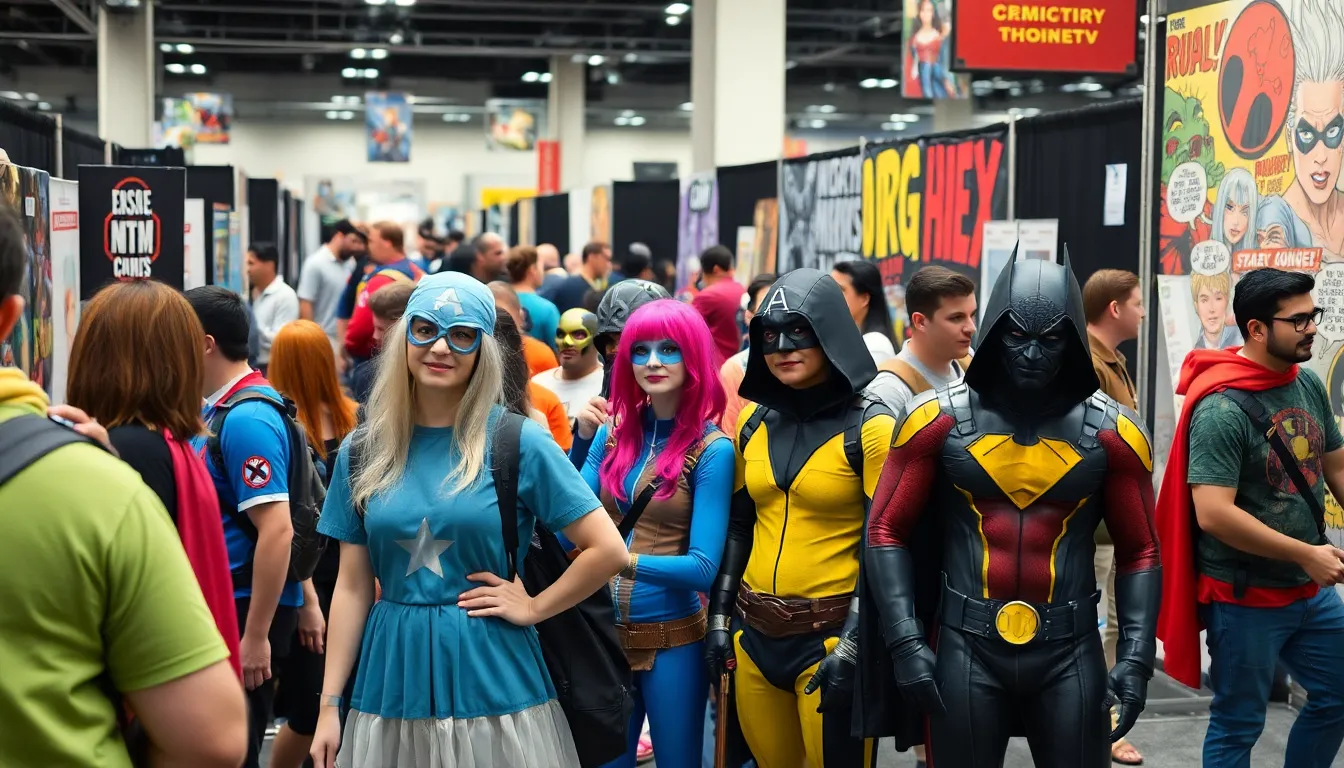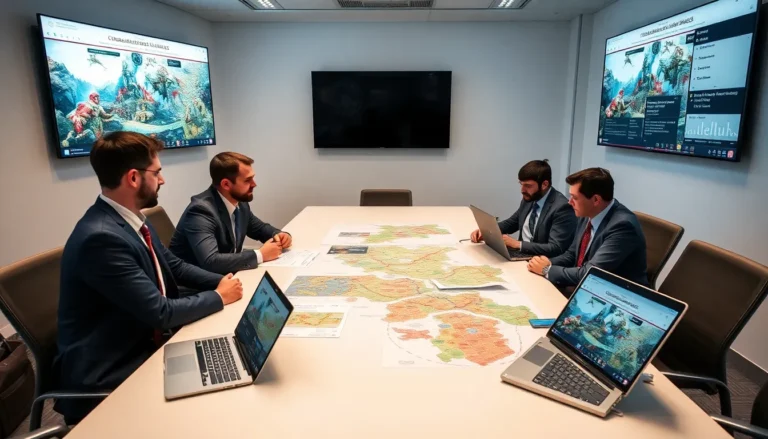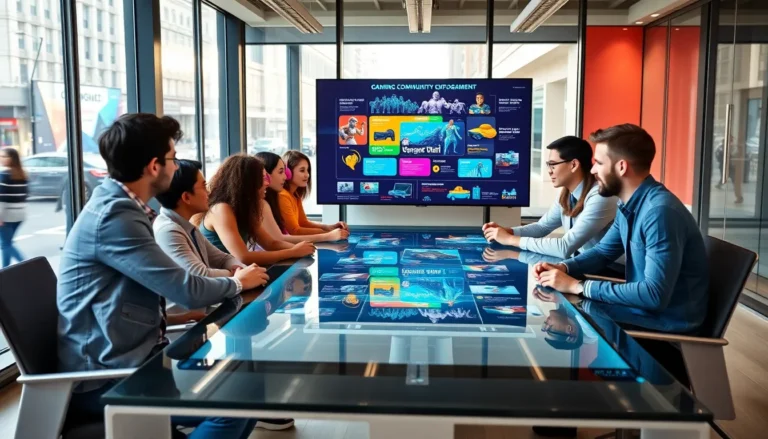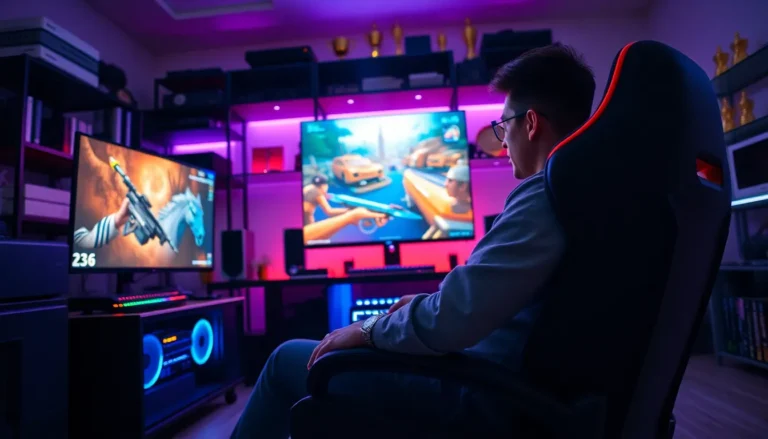Comic conventions are vibrant gatherings that celebrate the world of comics, pop culture, and fandom. These events draw thousands of enthusiasts who come together to share their passion for everything from superheroes to anime. With an array of panels, workshops, and exclusive merchandise, comic conventions offer an immersive experience that captivates attendees of all ages.
For many, these conventions are more than just a chance to meet creators and celebrities; they’re a place to connect with like-minded individuals. The atmosphere buzzes with excitement as fans showcase their cosplay, engage in discussions, and discover new stories. Whether someone’s a seasoned con-goer or a first-timer, the thrill of being part of this unique community is undeniable.
Table of Contents
ToggleOverview of Comic Conventions
Comic conventions are dynamic gatherings that draw significant crowds, celebrating various elements of comics and pop culture. These events typically feature a diverse range of activities, including panels led by industry professionals, workshops for skill development, and vibrant exhibit halls showcasing merchandise.
Attendees experience immersive environments filled with opportunities to meet comic creators, filmmakers, and celebrities. They engage in discussions about their favorite series, films, and characters, fostering connections with fellow fans. Cosplay plays a vital role in these conventions, with participants often donning elaborate costumes that reflect their beloved characters.
Many conventions also offer exclusive merchandise, attracting collectors and enthusiasts eager to acquire limited-edition items. Additionally, networking opportunities abound, as professionals from different sectors of entertainment converge, sharing insights and experiences.
Comic conventions vary in scale, from local gatherings to massive events like San Diego Comic-Con, which attracts over 130,000 attendees each year. Such conventions not only celebrate existing fandoms but also pave the way for emerging talent and new creative projects within the comic book and entertainment industries.
History of Comic Conventions

Comic conventions have evolved significantly since their inception, growing from small gatherings into large-scale events that celebrate comics and pop culture. This transformation reflects the increasing popularity of the comic medium and its related industries.
Origins and Evolution
Comic conventions originated in the early 1960s as small gatherings of comic book fans. The first known convention, New York Comic-Con, took place in 1964, organized by a group of comic enthusiasts. These events featured discussions, art showcases, and opportunities to buy comics. In the late 1970s, conventions began to draw celebrity guests, enhancing their appeal. By the 1980s, conventions expanded to include multimedia aspects, incorporating anime, video games, and film. As interest grew, so did the conventions’ scale, leading to significant events like San Diego Comic-Con, which debuted in 1970.
Major Milestones
Several key milestones shaped the landscape of comic conventions:
- 1964: The first comic convention, New York Comic-Con, occurs.
- 1970: San Diego Comic-Con launches, becoming a prototype for future conventions.
- 1980s: The introduction of celebrity guests attracts broader audiences and media attention.
- 1990s: Internet forums and websites begin to promote conventions, increasing attendance.
- 2000s: Major Hollywood studios leverage conventions for film promotions, integrating pop culture into convention programming.
- 2010s: Comic conventions diversify with the inclusion of cosplay contests, gaming tournaments, and themed workshops.
These milestones demonstrate the vibrant growth of comic conventions, illustrating their influence on fandom culture and the creative industries.
Popular Comic Conventions
Various comic conventions attract thousands of attendees each year, offering unique experiences and opportunities for fans and creators alike. Below are some of the most notable events in the comic convention landscape.
San Diego Comic-Con
San Diego Comic-Con (SDCC) stands as the largest and most recognized comic convention, hosting over 130,000 participants annually. Established in 1970, it showcases a diverse array of panels, workshops, and exclusive merchandise. Comic book publishers, film studios, and TV networks use SDCC as a platform to promote upcoming projects, revealing sneak peeks and trailers. Celebrity appearances generate significant excitement, and the event features iconic cosplay presentations. SDCC’s extensive programming highlights the latest trends in comics and pop culture, making it a must-attend event for enthusiasts and industry insiders.
New York Comic Con
New York Comic Con (NYCC), founded in 2006, has rapidly grown to become one of the largest conventions in the United States. It attracts over 250,000 fans each year, celebrating the latest in comics, movies, TV shows, and gaming. NYCC features numerous panels led by renowned creators and stars, alongside exclusive merchandise and interactive experiences. The event showcases a heavy focus on diversity and inclusivity, providing a platform for underrepresented voices within fandom and the comic industry. Additionally, NYCC supports various workshops and networking events, fostering a rich community for both fans and creators.
Other Notable Conventions
Several other notable conventions contribute to the vibrant comic culture, each with unique characteristics:
- Emerald City Comic Con: Held in Seattle, this convention emphasizes independent creators and comic artistry, attracting approximately 100,000 attendees.
- Dallas Comic Con: This event features a blend of pop culture elements, drawing a significant local crowd with a focus on celebrity panels and vendor exhibits.
- WonderCon: Located in Anaheim, California, WonderCon serves as an excellent platform for comic book publishers and showcases various media, gathering around 60,000 participants.
- Chicago Comic & Entertainment Expo (C2E2): C2E2 emphasizes both comics and pop culture, bringing together many fans and creators in the heart of Chicago.
These conventions celebrate the expansive world of comics and entertainment, offering varied experiences that cater to different interests and communities.
The Experience of Attending Comic Conventions
Attending comic conventions offers a vibrant atmosphere filled with activities that engage fans across diverse interests. From immersive workshops to elaborate cosplay, conventions create memorable experiences for attendees.
Panels and Workshops
Panels and workshops feature discussions led by industry professionals, creators, and celebrities. Events often include Q&A sessions, where fans can interact directly with their favorite artists and writers. Workshops provide hands-on opportunities to learn skills such as comic art techniques or storytelling. Attendees gain valuable insights into the comic industry and can explore emerging trends, enhancing their appreciation for the medium.
Exhibitor Showcase
Exhibitor showcases present a wide array of vendors, publishers, and independent creators. Attendees can browse unique merchandise, including exclusive comics, collectibles, and artwork. Major publishers often unveil new titles and projects, offering fans a first look at upcoming releases. Independent creators showcase innovative ideas, creating a platform for new talent to connect with audiences. The exhibitor area fosters excitement, promoting a sense of community among fans and vendors.
Cosplay Culture
Cosplay culture thrives at comic conventions, with attendees dressing as their favorite characters. Cosplay contests celebrate creativity and craftsmanship, attracting participants of all skill levels. Many conventions feature dedicated spaces for photoshoots, allowing cosplayers to showcase their designs. This vibrant aspect of conventions encourages self-expression and fosters connections among fans who share a passion for their chosen characters.
The Impact of Comic Conventions
Comic conventions significantly influence pop culture and the comics industry. These events shape trends, foster creativity, and build community among fans and creators.
On Pop Culture
Comic conventions solidify their role as cultural landmarks that celebrate and amplify diverse aspects of pop culture. They serve as launching pads for new trends, with attendees exposed to fresh content, media, and artistic expressions. Major conventions, like San Diego Comic-Con, often unveil big-budget films, TV series, and exclusive merchandise, attracting widespread media attention. Such exposure contributes to the overall cultural dialogue, leading to increased visibility for various fan-driven projects, independent creators, and emerging genres. As a result, comic conventions function as incubators for cultural movements and leisure activities that resonate with a broader audience.
On the Comics Industry
Comic conventions directly influence the comics industry by providing critical networking opportunities for creators and publishers. These events enable industry professionals to showcase new content, pitch projects to publishers, and gain feedback from fans. Workshops and panels led by experienced creators offer insights into publishing trends, storytelling techniques, and marketing strategies, helping both emerging and established talents navigate challenges. The presence of publishers at conventions increases the visibility of new titles and artists, leading to potential sales spikes and distribution deals. Comic conventions play a vital role in the industry’s evolution, ensuring a thriving ecosystem for creativity and innovation within the comic book landscape.
Comic conventions continue to be vibrant celebrations of creativity and fandom. They provide unique opportunities for fans to immerse themselves in their favorite worlds while connecting with like-minded individuals. The diverse activities and engaging panels not only entertain but also educate attendees about the industry.
As these conventions evolve they remain crucial in supporting emerging talent and promoting new projects. They serve as essential platforms for networking and collaboration, ensuring that the comic book and entertainment industries thrive. With each event, the passion and dedication of the community grow stronger, making comic conventions an integral part of pop culture.




